|
|
|
Sort Order |
|
|
|
Items / Page
|
|
|
|
|
|
|
| Srl | Item |
| 1 |
ID:
182843


|
|
|
|
|
| Summary/Abstract |
Over the course of the first two decades of the twenty-first century, within the occupied Palestinian territories, photographic technologies and image-oriented politics would grow increasingly central as activist and human-rights tools of bearing witness to Israeli state and settler violence. This essay investigates the Israeli right-wing and international Zionist response to these Palestinian visual archives and their perceived threat. In particular, it tracks the rise and normalization of a repudiation script that impugned the veracity of these images, arguing that they were fraudulent or manipulated to produce a damning portrait of Israel. Drawing on post-colonial and settler-colonial studies, as placed into dialogue with digital media studies, the essay focuses on three cases studies of repudiation (2000, 2008, 2014, respectively) to consider how the long colonial history of repudiation in the Israeli context would be progressively updated by right-wing Israelis and their international supporters to meet the challenges posed by the smartphone age. By the second decade of the twenty-first century, the script had become an increasingly standard Zionist response to viral images of Palestinian death or injury at Israeli state or settler hands. Repudiation was thus marshaled as a solution to the viral visibility of Israeli state violence by bringing the otherwise damning images back into line with dominant Israeli ideology, a process of shifting the narrative from Palestinian injury to Israeli victimhood. The story of the “false” image of Palestinian injury endeavors strips the visual field of its Israeli perpetrators and Palestinian victims, thereby exonerating the state. Or such is the nature of this digital fantasy in the Israeli colonial present.
|
|
|
|
|
|
|
|
|
|
|
|
|
|
|
|
| 2 |
ID:
106625


|
|
|
|
|
| Publication |
2011.
|
| Summary/Abstract |
Although the impressive diversity of the World Social Forum (WSF) is regularly noted, there has been little analytical work done on the degree to which the praxis of the WSF is enabling communicability across previously unbridged difference and how relations of power, particularly the coloniality of power, shape these interactions. Based on extensive participant observation at the WSF, this article analyses the 'open space' of the WSF as a 'contact zone' that, in different facets of this complex praxis, is both cosmopolitan and colonial. The author employs the differing conceptions of the contact zone, drawing on the work of Boaventura de Sousa Santos and Mary Louise Pratt, in dialogue with notions of coloniality and colonial difference arising from Latin American studies to illumine the analysis.
|
|
|
|
|
|
|
|
|
|
|
|
|
|
|
|
| 3 |
ID:
157719
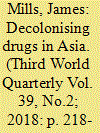

|
|
|
|
|
| Summary/Abstract |
This article examines a drugs trade in Asia that has been largely forgotten by historians and policy-makers, that in cocaine. It will briefly trace some of the contours of this commerce and the efforts to control it. It will also assess how successful these efforts were. The article is designed to contribute fresh perspectives on recent controversies in the historiography of drugs in Asia to argue that the agendas and agency of consumers are central to understanding why markets have formed there for psychoactive substances in the modern period.
|
|
|
|
|
|
|
|
|
|
|
|
|
|
|
|
| 4 |
ID:
121834
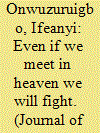

|
|
|
|
|
| Publication |
2013.
|
| Summary/Abstract |
Accepting that the Land Question was only limited to former settler colonies in Africa such as Kenya and Zimbabwe, dominant opinion in the literature has tended to trivialize the bitter struggles for land, many of which began during the colonial dispensation in many African nations. With globalization, democratization, structural adjustment and intensification of identity politics, many of these land conflicts have lingered. Yet studies of the conflicts, as in the case of Aguleri/Umuleri, have been scanty and almost ignore their historical and colonial roots. This paper explores colonial foundations of Aguleri/Umuleri conflicts, colonial policies designed to manage them and why they failed.
|
|
|
|
|
|
|
|
|
|
|
|
|
|
|
|
| 5 |
ID:
153533


|
|
|
|
|
| Summary/Abstract |
In Vietnamese medicine, gia truyền (“family recipes”) refers to a set of texts, primarily in chữ nôm (demotic Vietnamese characters), that preserves local knowledge about how practitioners in a specific family-based medical circle could use various plants and other materia medica to cure disease. This article traces the history of the transmission of gia truyền in the 19th and 20th centuries. It suggests that prior to the 1920s, gia truyền were written anonymously to protect the author’s identity in the face of the Nguyễn dynasty’s repression of chữ nôm writing. In the 1920s, precisely at the time that hán-nôm writing was being eclipsed by education in French and quốc ngữ (Romanized Vietnamese), Vietnamese medical practitioners experienced a renaissance in the writing of chữ nôm gia truyền. Moreover, chữ nôm writing in the gia truyền genre continued until at least the 1990s.
|
|
|
|
|
|
|
|
|
|
|
|
|
|
|
|
| 6 |
ID:
112138


|
|
|
|
|
| Publication |
2012.
|
| Summary/Abstract |
Intimate interactions across ethnic and cultural lines were integral to the archive of memory within Eurasian families in colonial Penang. Through histories of their European and Asian ancestors, Eurasian families inherited a sense of travel and geographical mobility, and complex forms of cultural exchange often shaped their everyday lives. Eurasian family histories provide access to the messy, lived interactions which formed their social and domestic worlds, but they also hint at their limits. The idea of 'Eurasian' in colonial Malaya was a contentious one, a site for debate, as it was experienced by different people in different ways. During the interwar period, members of Penang's Eurasian elite attempted to define and discipline the divided Eurasian communities of Malaya, by purifying Eurasian family histories of their unruly diversity. In exploring the Eurasian social world of colonial Penang, this paper aims to delineate the fragility of such processes of interaction and exchange.
|
|
|
|
|
|
|
|
|
|
|
|
|
|
|
|
| 7 |
ID:
102755
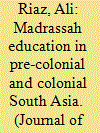

|
|
|
|
|
| Publication |
2011.
|
| Summary/Abstract |
This paper traces the history of madrassahs (Islamic seminaries) in South Asia from their inception in the 12th century until the end of colonial rule in 1947. The paper argues that many of the pre-colonial rulers of South Asia, including the Mughals (1526-1857), played key roles in promoting education and providing patronage of various educational institutions, including madrassahs. The policies of British colonial rule (1757-1947), however, made the most indelible marks on madrassah education, not only directly, wherein their policies have impacted on the structure, functions and curriculum of madrassahs, but also indirectly, through the prompting of responses from the ulama and the Muslim community that determined the contours and the content of madrassah education. The paper examines the roles of various strands of madrassah education, and the interplay of politics and curriculum of various major madrassahs. The paper demonstrates that madrassah as a concept and as an institution has come a long way, that its contents and contours have undergone changes, and that as an institution it has largely remained embedded within the society.
|
|
|
|
|
|
|
|
|
|
|
|
|
|
|
|
| 8 |
ID:
079361
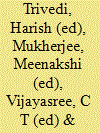

|
|
|
|
|
| Publication |
New Delhi, Oxford University Press, 2007.
|
| Description |
xxxii, 312p.
|
| Standard Number |
0195690249
|
|
|
|
|
|
|
|
|
|
|
|
Copies: C:1/I:0,R:0,Q:0
Circulation
| Accession# | Call# | Current Location | Status | Policy | Location |
| 052621 | 327/TRI 052621 | Main | On Shelf | General | |
|
|
|
|
| 9 |
ID:
112381


|
|
|
|
|
| Publication |
2012.
|
| Summary/Abstract |
This paper draws on Okot p'Bitek's Song of Lawino and other critical voices to argue that education in Africa is victim of a resilient colonial and colonizing epistemology, which takes the form of science as ideology and hegemony. Postcolonial African elite justify the resilience of this epistemology and the education it inspires with rhetoric on the need to be competitive internationally. The outcome is often a devaluation of African creativity, agency and value systems, and an internalized sense of inadequacy. Education has become a compulsion for Africans to 'lighten their darkness' both physically and metaphorically in the interest of and for the gratification of colonizing and hegemonic others. The paper calls for paying more attention to popular systems of knowledge, in which reality is larger than logic. It calls for listening to ordinary men and women who, like p'Bitek's Lawino, are challenging the prescriptive gaze and grip of emasculated elite.
|
|
|
|
|
|
|
|
|
|
|
|
|
|
|
|
| 10 |
ID:
129970
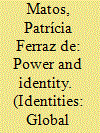

|
|
|
|
|
| Publication |
2014.
|
| Summary/Abstract |
This article reflects on the inclusion of human beings in the colonial representations of the great exhibitions that Portugal organised or took part in during the first half of the twentieth century. It analyses the role played by the natives (from the Portuguese colonies), as well as the way they were represented and treated, based on various documents and interviews and on the study of the exhibition creation process. These exhibitions revealed some underlying tensions. On the one hand, they provided evidence of the differences between the 'civilised' and the 'uncivilised', of the diversity of 'races' and of their places in a hierarchy of civilisation. On the other, they extolled the way colonised peoples adopted Portuguese models. The ways those human beings have asserted their existence, under the power of the exhibition's organisers, provides a means to understand how they forged and assumed their identities in a context of rules.
|
|
|
|
|
|
|
|
|
|
|
|
|
|
|
|
| 11 |
ID:
114654


|
|
|
|
|
| Publication |
2012.
|
| Summary/Abstract |
Reviving Ayurveda in post-colonial India has paradoxically been a nationalist venture, where the post-colonial state has restructured traditions, rather than reviving traditional Ayurvedic education, training and apprenticeship. After more than a half century of Indian independence, the majority of Ayurvedic practitioners perceive the impact of British colonial rule negatively, despite the fact that they followed Western methods and frameworks to revive Ayurveda. Today, the training in and research of Ayurvedic education has moved out of the traditional apprenticeship system and into the formal education system. This paper argues that the formalisation and professionalisation of Ayurveda has created an avenue for Ayurvedic graduates to practise backdoor allopathic medicine. Modern-day Ayurvedic practitioners tend to perceive their Ayurvedic training from an allopathic perspective.
|
|
|
|
|
|
|
|
|
|
|
|
|
|
|
|
| 12 |
ID:
147470
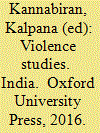

|
|
|
|
|
| Publication |
India, Oxford University Press, 2016.
|
| Description |
viii, 396p.Hbk
|
| Series |
Oxford India studies in contemporary society
|
| Standard Number |
9780199464821
|
|
|
|
|
|
|
|
|
|
|
|
Copies: C:1/I:0,R:0,Q:0
Circulation
| Accession# | Call# | Current Location | Status | Policy | Location |
| 058787 | 303.6/KAN 058787 | Main | On Shelf | General | |
|
|
|
|
|
|
|
|
|